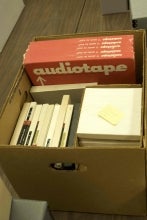Knowledge (or Intangible Cultural Heritage) Repatriation

One of the more unusual aspects of being an archivist is that people often have no idea what you do. This, shall we say, lack of information has inspired me to write an occasional series about what it is that archives and archivists do.
I thought I would begin with something that would be of particular interest to ethnomusicologists. Knowledge repatriation.
When museums speak of repatriating materials, they mean they are returning an original physical object to its culture and/or country of origin.
However, when audiovisual archivists speak of knowledge or cultural repatriation, we are talking about returning Intangible Cultural Heritage (ICH) to its culture and/or country of origin.
UNESCO defines ICH thusly: "Cultural heritage does not end at monuments and collections of objects. It also includes traditions or living expressions inherited from our ancestors and passed on to our descendants, such as oral traditions, performing arts, social practices, rituals, festive events, knowledge and practices concerning nature and the universe or the knowledge and skills to produce traditional crafts."
UNESCO continues, "The importance of intangible cultural heritage is not the cultural manifestation itself but rather the wealth of knowledge and skills that is transmitted through it from one generation to the next."
That is what archivists and archives do when we repatriate materials, we makes copies of original recordings and return the copies to the culture group of origin, ensuring that ICH can be "transmitted ... from one generation to the next."
UNESCO also speaks about Safeguarding Intangible Cultural Heritage, "Safeguarding intangible cultural heritage is about the transferring of knowledge, skills and meaning." Again, archivists are part of the safeguarding process, as are the cultural researchers whose field recordings fill archives.
Broadly speaking, audiovisual archives were originally created for scholars, a safe haven for their research materials, but now a/v archives are as (or more!) important to the descendents of those peoples whose recordings we hold. Recordings are important for the ICH, of course, but field recordings are now being used for so much more. For example, Australian Aboriginal songs have been used as evidence in Australian Aboriginal land claims cases.
As Professor Anthony Seeger has said, "I have sometimes referred to archival collections as weapons in the struggle for the self-determination of individuals and communities."
As ethnomusicologists, please consider giving your field recordings to an archive. You are preserving your recordings, and the Intangible Cultural Heritage saved on them, not only for scholars, but for the community.
For additional reading
The National Film and Sound Archive, Australia, gave a paper at the 2012 International Council of Archives Congress in Brisbane, Australia, entitled, "Cultural Connections: heritage, communities and the audiovisual experience" that speaks directly to NFSA's experiences in repatriating materials to indigenous communities.
Intellectual Property Management in an Ethnomusicology Archive: An Empirical View from India, prepared for the World Intellectual Property Organisation (WIPO) by Shubha Chaudhuri
"Pretty Fly for a White Guy: Audio Repatriation to Arnhem Land," S. J. Angel, University of Wollongong
"History, memory and music: The repatriation of digital audio to Yolngu communities, or, memory as metadata," Peter Toner, University of Sydney
Ethical Principles for Sound and Audiovisual Archives (International Association of Sound and Audiovisual Archives (IASA), 2010 (revised 2011))
"American Indian Musical Repatriation" in Garland Encyclopedia of World Music Volume 3: The United States and Canada
Aboriginal and Torres Strait Islander protocols for libraries, archives and information services
Ethical Protocols for Working with Indigenous Australians
Protocols for Native American Archival Materials (First Archivist Circle)
United Nations. Declaration on the Rights of Indigenous People
Native Language Preservation, Establishing Archives and Repositories





